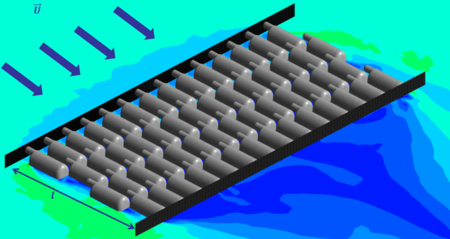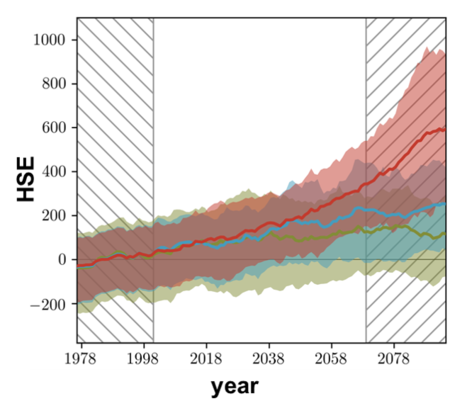WG Barn climate and emission modelling
The working group 'Barn climate and emission modelling' develops, adapts and validates empirical and mechanistic models for the description and prediction of temperature distribution and air quality in naturally ventilated barn systems as well as pollutant transport processes in connection with livestock production. The models are also applied in the evaluation of options for the adaptation of livestock housing systems to climate change and the reduction of emissions.

In the field of mechanistic modeling, the group uses computational fluid dynamics (CFD) to characterize the interaction of different model forcings (e.g. incident flow, temperature gradients and building design) on flow and transport processes in and around livestock housing facilities. The process-oriented modeling includes, among others, the implementation of sources of heat and pollutant gases in the numerical flow model as well as the evaluation of new meshing algorithms and parameterizations of complex geometries for the runtime-efficient calculation of the flow process.

In the field of empirical modeling, we use, in close collaboration with the NWG Data Science in Agriculture, various data science methods, from multilinear regression to artificial neuronal networks, Ensemble approaches and Bayesian learning. These data-driven models aim at predicting future values of different variables (e.g. temperature-humidity index in the barn, air exchange rate in a defined area of the barn or annual emission of harmful gases) from observations of the dynamics of certain descriptive variables (e.g. local wind speed and direction, ambient temperature, etc.). Furthermore, we investigate the effects of time, frequency and duration of data collection under practical conditions on the accuracy of the predictions of various empirical models.
The combination of field studies and laboratory data from the boundary layer wind tunnel forms the basis for the validation and optimization of our models.
Thus, a solid data basis is created to promote the further development of technology and procedures in animal husbandry, combining aspects of animal welfare and environmental protection.
Research equipment
Hardware for complex, parallelized simulations
- Local workstation with 48 CPUs
- Graphics card server with 3000 GPUs
- CFD Server with 32 CPUs
- Access to external data centers (HLRN, Leibniz-Rechenzentrum LRZ)
Software packages for CFD modeling (ANSYS, OpenFoam) and preprocessing (SolidWorks, Matlab)
Virtual Reality System for 3D visualization of the results
Software packages for data analysis and empirical modeling (R, Python, SAS)
- Different models of animal barns
- 2D Laser Doppler Anemometer (LDA)
- Flame Ionization Detector (fast-FID)
- Hot-wire anemometry
Long-term measuring set-ups in experimental barns with automated data transfer
- 3D ultrasonic anemometer
- Temperature-Humidity Sensors
- Photoacoustic Gas Monitor
- FTIR Spectrometer
- CRD Spectrometer
Published validation data sets
Willink, D., Hempel, S., Janke, D., Amon, B., Amon, T. 2020. High resolution long-term measurements of carbon dioxide, ammonia, and methane concentrations in two naturally ventilated dairy barns. PUBLISSO Repository for Life Sciences, doi:10.4126/FRL01-006421675
Janke, D., Yi, Q., Hempel, S., Thormann, L., Amon, B., Amon, T., 2020. Velocity measurements of a 1:100 scaled model of a naturally ventilated dairy barn in an atmospheric boundary layer wind tunnel. PUBLISSO Repository for Life Sciences, doi:10.4126/FRL01-006420859
Team of the WG
Dr. El Hadj Moustapha Doumbia
Dr. Razieh Abdollahipour
M.Sc. Alaei Ali
B.Sc. Abhijith Srinivas Bidaralli
B.Sc. Anthony Noronha

